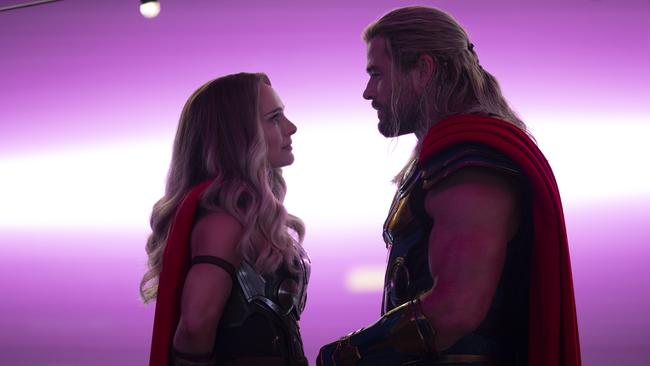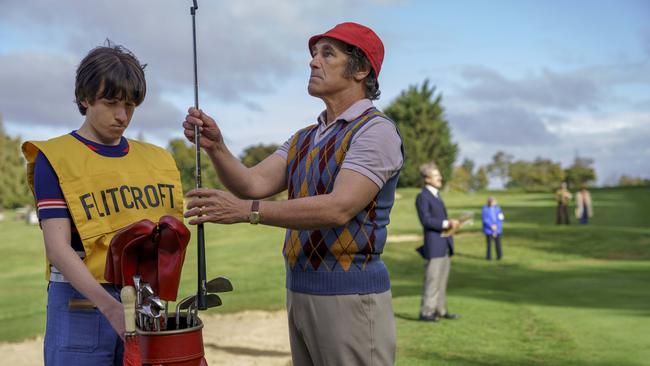Thor: Hemsworth stretches his comic muscles
The star is almost vaudevillian in Thor: Love and Thunder, one of the funnier superhero movies I’ve seen.

Thor: Love and Thunder (M)
In cinemas
★★★½
“You know what they say: Never meet your heroes.” So laments Thor (Chris Hemsworth) after a disillusioning first date with Zeus (Russell Crowe).
The extended interlude between Thor and Zeus is one of the comic highlights of Thor: Love and Thunder, which is one of the funnier superhero movies I’ve seen.
It’s humorous on a couple of levels. There’s the antics between the two gods, which includes Hemsworth flexing in the buff and the Oscar winner Crowe doing the Greek deity like someone from the Carry On gang.
Then there’s the meta humour of the “pretty boy” (as Zeus calls him) of the silver screen meeting someone he has looked up to all his life.
That sort of possum poking runs through this movie directed and co-written by the somewhat eccentric New Zealand filmmaker Taika Waititi.
Asked at the Sydney premiere if this action adventure doubled as the first superhero rom-com, he replied that he had no idea, as he did not watch other people’s films.
The director is also the occasional narrator, via Korg of Krona, a rock of a friend to Thor of Asgard. He’s the one who, early on, brings us up to date with Thor’s life story so far. Thor has seen a lot of death, including of his brother Loki, his brother Loki and his brother Loki. Flashbacks to each of Loki’s on-screen deaths are a playful reminder that in a superhero film death is but a passing phase.
In another in-joke, star actors Matt Damon and Sam Neill return as the Asgardian actors playing Loki and Odin on the stage for the entertainment of the masses.
In this play within a film, Thor is played by real life brother Luke Hemsworth.
It’s all a lot of fun. Waititi, who directed Thor: Ragnarok (2017), has said he only wanted to return to the Norse god of thunder if he could do something creative.
If it sounds like he’s turned to comedy to achieve that, I think that’s partly true.
Hemsworth was funny as the beer-swilling chubby Thor in the previous film. This time he is almost vaudevillian throughout. Seeing him stretch his comic muscles makes me look forward to what he might do in the future.
It’s true that this movie is part rom-com. There’s also a flirtation with homoerotic longing. Whether the latter is spotted by censors in the Middle East remains to be seen.
Thor’s lost the beer gut but gained a midlife crisis. “He went from dad bod to god bod but he’s still sad bod on the inside,’’ Korg tells us.
His angst is exacerbated by the return of his human girlfriend Jane Foster (a terrific Natalie Portman). She has the magical hammer, Mjolnir, and has transformed into Mighty Thor.
It’s unclear who Thor has missed the most in the eight years apart: the woman he loves or the hammer. “Come to daddy,” he whispers to Mjolnir.
The serious side of this movie, which was filmed in Sydney, is provided by the great Christian Bale as Gorr the God Butcher.
As his name suggests, he is angry with the gods and vows to wipe them out. He’s non-denominational: they all must die.
The best scene is when Gorr has Thor, Mighty Thor, Korg and King Valkyrie (Tessa Thompson) pinned to the walls of a cave. He approaches each and tells them his thoughts. When they try to reply, their mouths are bound shut.
It’s a first-rate dramatic sequence that, for huge fans of Bale, like this reviewer and his teen co-viewer, can also be seen as him delivering a masterclass in performance.
I had this 120-minute movie at four stars for a long time, largely because it made me laugh a lot. However, the final half-hour is a predictable – perhaps inevitable – return to the Marvel superheroes-fight-supervillains footprint.
As always there is a post-credits sequence and, as always, it is worth waiting for.
It sets up a sequel that could be very funny indeed. I’ll reveal no more except to say that it features one of the stars of the hit TV series Ted Lasso.
-
The Phantom of the Open (PG)
In cinemas
★★★½
“For every winner of a tournament there’s 149 losers.” That’s an honest – and personally germane — observation by British crane driver Maurice Flitcroft (Oscar winner Mark Rylance), who made headlines at the 1976 British Open golf championship.
The chain-smoking Flitcroft, who barely knew one end of a golf club from the other, scored 121 in the qualifying round, a record high for the tournament.
When a journalist tells his wife Jean (Oscar nominee Sally Hawkins) that her husband made the highest score in history, she thinks he’s the winner. When she’s told that over 18 holes it’s low scores that matter, she says, “At least he tried.”
The media latched onto the story of the Barrow-on-Furness shipyard worker who gatecrashed the greenest of pastures. It was a headline writer’s dream and the film title, The Phantom of the Open, is drawn from real life, as is all that follows in this delightful British comedy-drama.
When Donald Trump became US president, some comedians said satire had been overtaken by reality. There may be some truth to that but it’s hardly the first time it has happened.
If you, like this reviewer, are sub-par when it comes to knowing anything about Flitcroft, there will be times where you think, ‘‘C’mon, did he really do that?”
He is 46 when he hoaxes his way into the British Open. Rylance and Hawkins are a delight to watch. “What’s that mean, handicap?’’ she asks as they fill out the entry form. “Must be my ailments, I suppose,’’ he replies.
It’s on that entry form that he shows a dexterity he lacks on the links. He ticks the box marked “professional”, which guarantees automatic entry. When golf official Keith Mackenzie (an excellent Rhys Ifans) is shown the form and asked if this unknown player has marked the wrong box, he harrumphs, “I don’t think anyone’s going to be stupid enough to do that.’’ He’s right in a sense.
The qualifying round, after which Flitcroft is crowned “the world’s worst golfer”, is full of the sort of humour that the British do so well.
The first golfer he meets in the locker room is a handsome young man who speaks Spanish. “Just call me Seve,’’ he says. You don’t have to be big on the birdies to know who that is.
When Flitcroft is in the sand bunker, yet again, striking at the ball over and over, the television commentator remarks, “At this rate he’s going to end up in Australia”.
And the 1976 British Open is just Flitcroft’s first fanciful flirtation with the golf establishment. What he goes on to do is even more unlikely than a hole-in-one. It’s the bit where reality trumps satire.
This 102-minute film is directed by Craig Roberts (his previous film, Eternal Beauty, also starred Hawkins) and written by Simon Farnaby, who featured in the Horrible Histories TV series. It’s based on a 2010 biography of Flitcroft written by Farnaby (who has a cameo as a golfer) and Scott Murray.
The drama comes from Flitcroft’s sons: the adopted Michael (Jake Davies), who rises to management at the shipyard and thinks his dad embarrasses the firm, and the twins Gene and James (Christian and Jonah Lees), who want to be world disco champions. The soundtrack rides along with their dream.
As a jolly post-credits sequence tells us, the disco dimension is also true. It shows us the real Flitcroft, who died in 2007, on the golf course and with his family.
There’s a lovely scene where Maurice and Jean, with their sons listening, share the well-known Oscar Wilde quote: “We are all in the gutter but some of us are looking at the stars.”
Suit-and-tie Mike worries about the gutter. Jean and the twins look to the stars. The man at the centre of it all, the husband, father and hoodwinker, is somewhere in between.





To join the conversation, please log in. Don't have an account? Register
Join the conversation, you are commenting as Logout